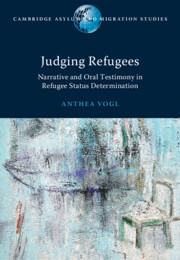Book contents
- Judging Refugees
- Cambridge Asylum and Migration Studies
- Judging Refugees
- Copyright page
- Contents
- Foreword
- Acknowledgements
- Abbreviations
- 1 Introduction
- 2 Law, Literature and Narrative in the RSD Oral Hearing
- 3 How Did We Get Here? A History of the Oral Hearing in Australia and Canada
- 4 The Stock Narrative of Becoming a Refugee
- 5 Narrative Contest as Structuring the Oral Hearing
- 6 ‘I’ll Just Stop You There’: Fragmentation of Refugees’ Oral Testimony
- 7 Beyond the Demand for Narrative: Genres of Refugee Testimony
- 8 Conclusion
- Appendix
- Index
2 - Law, Literature and Narrative in the RSD Oral Hearing
Published online by Cambridge University Press: 15 March 2024
- Judging Refugees
- Cambridge Asylum and Migration Studies
- Judging Refugees
- Copyright page
- Contents
- Foreword
- Acknowledgements
- Abbreviations
- 1 Introduction
- 2 Law, Literature and Narrative in the RSD Oral Hearing
- 3 How Did We Get Here? A History of the Oral Hearing in Australia and Canada
- 4 The Stock Narrative of Becoming a Refugee
- 5 Narrative Contest as Structuring the Oral Hearing
- 6 ‘I’ll Just Stop You There’: Fragmentation of Refugees’ Oral Testimony
- 7 Beyond the Demand for Narrative: Genres of Refugee Testimony
- 8 Conclusion
- Appendix
- Index
Summary
This chapter introduces the book’s central argument, that narrative plays a key role in refugee decision-making and calls for a critical politics of narrative within RSD. The chapter closely engages with the theoretical insights of law and literature studies, and of outsider storytelling scholarship as articulated by critical race, Indigenous and feminist law scholars, to explain how narrative is implicated in RSD and in the politics of whom states deem the ‘credible’ and ‘acceptable’ refugee. It introduces the book’s methodology in further detail, alongside the dataset of fifteen oral hearings before the Canadian Immigration and Refugee Board and the former Refugee Review Tribunal in Australia. The chapter goes on to articulate a working definition of the ‘model’ Anglo-European narrative form, which I argue shapes the reception and assessment of refugee testimony. The chapter finally address the barriers encountered in accessing refugee oral testimony, and the implications of such barriers for interrogation of the oral hearing as a site of narrative. In making a case for the disciplining role of narrative within refugee decision-making, this chapter critiques the celebration of story-telling as necessarily emancipatory or disruptive of law’s authority, and characterisations of narrative as distinct from legal discourse and power.
Keywords
- Type
- Chapter
- Information
- Judging RefugeesNarrative and Oral Testimony in Refugee Status Determination, pp. 23 - 39Publisher: Cambridge University PressPrint publication year: 2024

